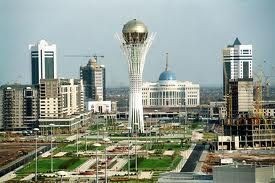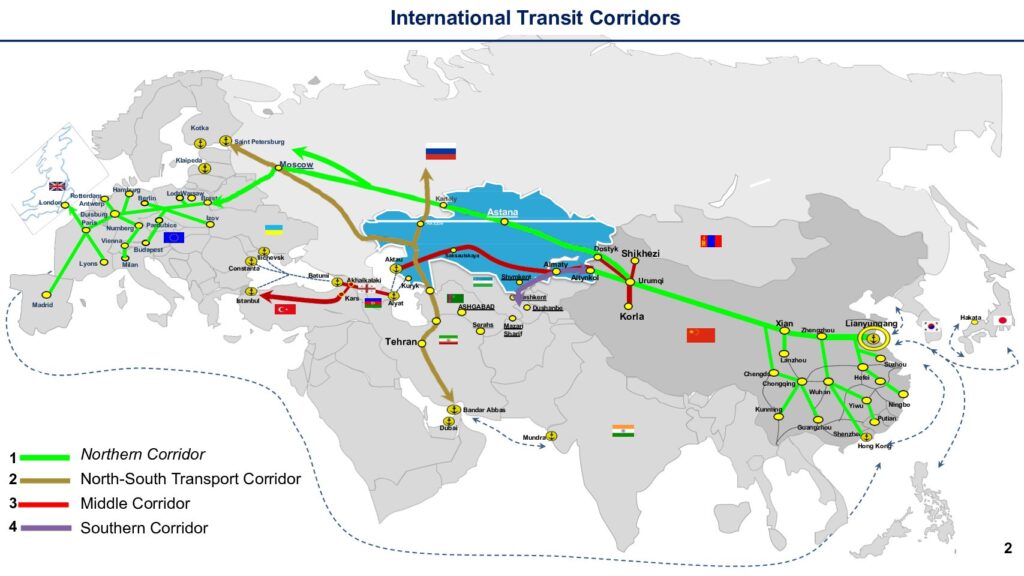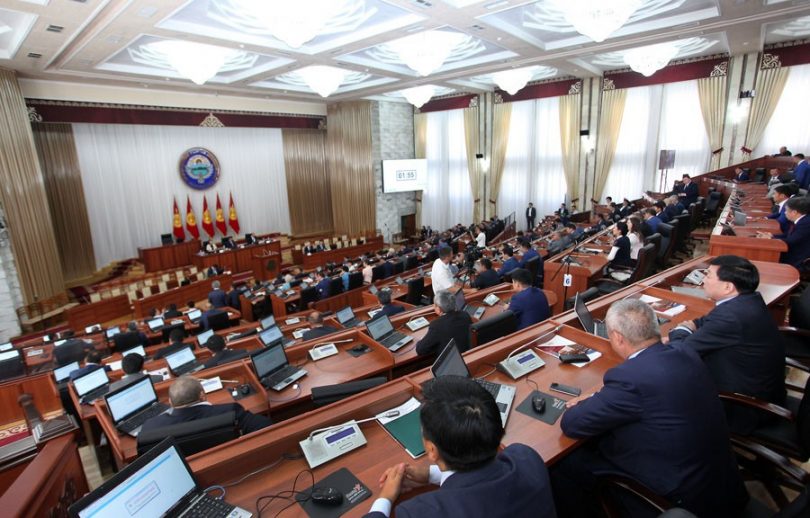ASTANA (TCA) — As Kazakhstan President Nazarbayev has announced a reform to transfer some of the presidential powers to the country’s Parliament and Government, we are republishing this article by Colin Stevens, originally published by EU Reporter:
The chairman of the European Parliament’s delegation to Kazakhstan has welcomed a radical shakeup of how the country is run. Iveta Grigule MEP, a Latvian deputy, told EU Reporter that the recently announced sweeping changes should be “positively valued”.
The Alde deputy was responding to a recent nationally televised speech by the country’s President Nursultan Nazarbayev who said political system faces “enormous” challenges and would be changed to a more parliamentary form of governance.
This will involve a “massive” redistribution of power, declared the President of Kazakhstan. Many of the powers he currently enjoys will be handed over to parliament, and the government will emerge out of the party that wins a majority in the legislature. Under the new system, the president will serve as liaison between the various branches of power and will focus on foreign policy, defence and homeland security. He also will have veto power over all the government’s decisions.
The changes, said President Nazarbayev, mean that the role and influence of parliament and government will be “significantly expanded” by the transfer of functions.
Under the changes, the process for passing a parliamentary no confidence in the government will be simplified while “large areas” of economic and social policy, previously under the control of the president, will be devolved to government ministers.
The blueprint outlined by President Nazarbayev foresees the transfer of no less than 40 presidential functions. The changes, which are the result of a working group set up by the president last year, will require amendments to the current constitution. The plans have now gone to public consultation which lasts until February 26. The overall aim of the sweeping reforms, he said, is to improve the efficiency of the public administration system.
In his address the President of Kazakhstan also unveiled “five top priorities” for what he termed the “third phase” of the country’s modernisation plans. Future priorities, he noted, should include improving and expanding the business sphere, achieving macroeconomic stability, and increasing the fight against corruption.
He explained that the presidential system had long served the country well because it was “necessary” for one man to take the helm of the country after the fall of the Soviet Union, but that the system had outlived its usefulness.
The announcement comes with the country, which recently marked its 25th anniversary of independence, assuming a bigger role on the world stage. On January 1, it began its tenure on the UN Security Council and this year hosts EXPO 2017. President Nazarbayev has also been engaged in international diplomacy as a mediator, most notably between Russia and Turkey. These developments, along with the country’s status as the largest Central Asian state, demonstrate its growing international profile, he said.
Reaction to the reform plans has been swift, with Grigule saying: “Kazakhstan is an important EU partner, and not only from the perspective of the Central Asian region. In recent years, relations between both sides have improved, becoming more intense and pragmatic. This is also evident from the Enhanced Partnership and Cooperation Agreement, which was signed between the EU and Kazakhstan more than a year ago.
“This large Central Asian country is an important partner for us Europeans in various fields, starting with questions of security, and ending with the new road to economic cooperation, and overcoming challenges. For this cooperation to be successful and beneficial for both sides, it is very important that both partners rely on common understanding and similar principles.
“Therefore, from the perspective of further EU-Kazakhstan relations, Kazakhstan President’s Nursultan Nazarbayev’s recent programmatical announcements and reforms are positively valued.
“Nazarbayev is a very experienced country leader and an outstanding strategist. He understands well that the ambitious goals which the country of Kazakhstan has set for itself until the years 2025 and 2050, can only be achieved through modernizing the country politically and technologically, as well as by providing greater support for entrepreneurship by decreasing the countries bureaucratic pressure on businesses; also, by ensuring health care, social care, and education for his people.
“Us Europeans should support the attempts of the country of Kazakhstan as much as possible through the already existing co-operation. It is within our common interests – a strong, safe, and economically developed Kazakhstan, which is not a threat to the EU but a trusted friend and co-operation partner.”
Slovakian EPP Member of the European Parliament Eduard Kukan said: “I welcome President Nazarbayev’s announcement in January and the subsequent public debate regarding the transfer of functions to the Government or the Parliament from the President’s office. His commitment to democratic reform is well noted and welcomed.
“A functioning Parliament is the cornerstone to any modern democracy, as is legislature’s control over the executive branch. The proposed package of reforms heads in this direction. This will be a long-term process, but I am glad to hear that the initial steps have been taken. Additionally, an effective public administration is essential to good functioning of any country, and I am pleased that Kazakhstan will be launching reforms in this regard as well.
“Kazakhstan is the first of our Central Asian partners having concluded an Enhanced Partnership and Cooperation Agreement with the European Union, and the EPCA is also one of the tools for supporting these reforms. I would also like to welcome the special and constructive regional role Kazakhstan has been playing in the Central Asian region. This is particularly important in light of its UN Security Council membership.”
Kamran Bokari, of Geopolitical Futures, a US-based global analysis company, said: “These changes constitute some measure of political reform. The Kazakhs will hope that the envisioned changes to the political system will allow the state to manage growing social pressures.”
A spokesman for the respected, Brussels-based European Institute for Asian Studies (EIAS), said: “Being a key member of the Eurasian Economic Union (EAEU) Kazakhstan has already been playing a major role in the economic stability of central Asian region. Now the recent administrative reforms would ensure the country’s global competitiveness.
“As the president rightly said, political modernization would in turn complement the strategic plan of Kazakhstan’s technological prowess, and would remain as the most fruitful way to achieve Kazakhstan 2050 strategy’s main goal of joining the group of 30 most-developed countries in the world.
“The proposed changes also reflect the aspirations of the new generation of Kazakh citizens. The president’s speech has rightly mentioned that the existing political system has been necessary to build a secure and stable Kazakhstan. That is the reason the president would still perform his role as an ‘arbiter’ concerned with the strategic functions of the foreign policy and the external relations with other key players in the region.
“However, as the country has been successful and stable in its internal social and economic matters, the proposed changes in these fields of governmentality would definitely match the diversified and widening aspirations of the new generation.”
The EIAS spokesman added: “The president has strategically chosen a unique path suitable for Kazakh realities of twenty-first century.”
Elsewhere, James Wilson, founding director of the International Foundation for Better Governance, said: “I welcome President Nazarbayev’s commitment to cutting red tape and reducing costs for business, and his openness to consider the options for greater privatisation of state owned businesses.
“Kazakhstan commands a unique strategic crossroads between China and the West and will benefit from the investment in infrastructure needed to implement China’s long term objective to develop the Belt and Roads Initiative, creating a ‘New Silk Road’. With the right business climate, Kazakhstan can be a catalyst for Chinese investment into Europe, and an important destination in its own right for European investment into Eurasia.
“To assist the future development and modernisation of Kazakhstan, it is important to strengthen the dialogue between Government and business, and to coordinate the advice from both national champions in Kazakhstan and foreign investors. There is definitely a role for business to strengthen the mechanisms for such a dialogue.
“The EU is Kazakhstan’s largest trading partner for the EU, and their economic and trade relations are governed by an enhanced partnership and cooperation agreement. It is important to continue to strengthen these economic links, both by enhancing the regulatory framework under which businesses operate, and by improving the investment environment for Kazakh companies in the EU, and EU companies operating in Kazakhstan.”








